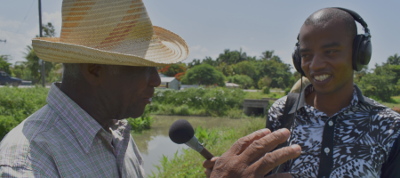Xalapa students attacked with machetes by masked men in police uniforms
June 8, 2015
The neighbourhood surrounding the Humanities Department of the Universidad Veracruzana is leafy and quiet. The ground floors of many houses have been turned into makeshift diners, serving satisfyingly cheap and greasy meals. Upper floors hold poky one room apartments where students gather to share 1 liter bottles of beer, listen to music and gripe about the government. At least, that's how I remember it. It probably hasn't changed much since I was there, except that on Friday one of those get togethers was interrupted by a gang of at least ten masked men, wearing police uniforms and armed with bats, sticks and machetes. They proceeded to beat eight university students, reportedly breaking jaws, knocking out teeth and smashing fingers. All eight required medical attention, three are still in hospital, and at least one requires surgery.
We'll probably never know who did this. It is a case study in the murky depths that lurk beneath even the most idyllic setting in Mexico. A spokesperson for the students accused the police. He said that investigative police who arrived on the scene shortly after the attack refused to help the students. They did begin to search for the culprits until unknown men in civilian clothing told them to call off the investigation. The director of the state police denied any involvement. Another police director said it would be "illogical" for the police to provoke instability in the state in this way.
The students are apparently not convinced. They even claim the public hospital attending them is colluding with the government against the students. Doctors have given incomplete updates to family members on the conditions of the students. Through spokespeople, they say they feel "panicked" by the heavy police presence in the emergency room, and report a number of undercover police informants in the hospital. (This sounds paranoic, but I remember them everywhere in Mexico, usually short-haired thuggish looking youth in colorful T-shirts, like marines dressed up to look like university students). They ask why the director of the university went in through the backdoor to meet the students, but avoided speaking to the press or the parents.
The three most seriously wounded students have since moved to a private hospital.
The attack came two days before Mexico's state and legislative elections. The weeks leading up to the elections have been full of tension, protests and electoral violence. There have been attacks on national voting offices in at least eight states, with tens of thousands of ballots burnt in the street. Last week a a group of students were charged with "terrorism" in the state of Puebla after the National Electoral Institute office was attacked with a Molotov cocktail. A similar attack ocurred in Xalapa. Most attacks were linked to protests over the disappearance of 43 students last year in the state of Guerrero, after an altercation with police in the pay of drug gangs. To complicate matters, the protesters have been joined by a breakaway teachers union opposed to education reforms that would require teachers to submit to testing.
The students in Xalapa, however, are members of an ecology activist group whose relationship to the Guerrero students or the teachers' union is not at all obvious. The newspapers say nothing about it but do mention that the Xalapa students participated in a march protesting the disappearances in Guerrero.
The state prosecutor, meanwhile, hinted at a deeper connection. He said his office was investigating a possible link between the attack on the students and the earlier firebomb attack on the National Electoral Institutes offices in Xalapa. Is that an intimation that the students are less innocent than they seem? This would be standard procedure in the Mexican game of veiled accusation-veiled counter-accusation. (Check out this bizarre exchange between Nobel laureate Rigoberto Menchu and the leader of the families of the disappeared students in Guerrero.) But seen another way, it also sounds like an admission of guilt: government retaliation for an attack against the government? Or maybe it is both?
We will never know. Reporters neither pressed, investigated on their own, or even speculated. For the reader, the questions are so exhausting, and just a tiny sample of the many more like it, that most will eventually give up and forget about it. The sun will keep shining on the Humanidades neighbourhood. The fritangas will keep frying in the luncherias, and students lucky enough not have their parties broken up by unknown attackers will go back to drinking and grousing ineffectually about the government.
Spanish language sources:



